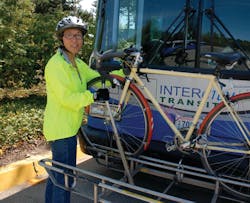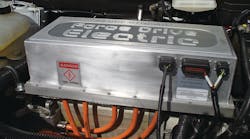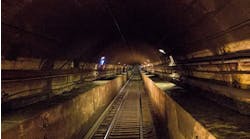Sound Transit and Intercity Transit Recognized for Sustainability Leadership
The American Public Transportation Association (APTA) recently awarded Seattle-based Sound Transit and Olympia-based Intercity Transit the nation's first "Gold" signatory status level for their individual agency commitments to sustainability.
The APTA Sustainability Commitment award recognizes organizations in the public transportation industry for their work preserving the environment, reducing waste, modeling social responsibility and helping bolster economic vitality in the regions they serve. APTA has four levels of recognition: Bronze, Silver, Gold and Platinum. To reach each level, agencies must show that they are maintaining an effective environmental compliance program and making continuous sustainability improvements. The Gold status indicates the agencies are becoming highly efficient in their management of natural resources, including energy, air pollutants, greenhouse gas emissions and water.
"Intercity Transit's sustainability efforts extend to every area of the agency and are embraced by its employees and leadership alike," said Intercity Transit General Manager Mike Harbour. "Our work is about making the community a better place to live by providing a diversity of quality transportation services, implementing innovative programs, developing successful partnerships, and acting as a good public steward of the environment we all share."
"Sustainability is a major priority in everything we do," said Sound Transit CEO Joni Earl. "It extends to more than offering fast and convenient services that take cars off the road. This recognition by APTA reflects other efforts that span everything from reducing emissions from our vehicles to incorporating sustainability into our project blueprints to using less paper around the office."
The two transit systems are among a short list of transit agencies nationwide practicing or pursuing Environmental Management System certification under standard 14001 of the International Organization for Standardization, sponsored by the Federal Transit Administration.
"APTA applauds the work that Intercity Transit and Sound Transit have been doing to become more sustainable and recognizes them for the Gold Standard they are setting on sustainability for the transit industry," said APTA Vice President of Strategy Petra Mollet.
Québec Government Committed to Electrification of Public Transit
Québec Premier Jean Charest recently announced the launch of an electric bus project at the Nova Bus headquarters in St-Eustache. Québec is investing CA$30 million in an ambitious CA$73 million public-private partnership that plans to develop electric buses for the international transit market.
The non-profit organization Consortium Bus Électrique has been established to lead the 3-year project. The group plans to produce two different-sized electric bus models. CA$27 million has been earmarked for the design and manufacture of a 40-foot electric bus to be developed by Nova Bus, Bathium Canada, TM4, Giro, René Matériaux Composites and Précicad. The other CA$3 million will fund the design and manufacture of a 25-foot aluminum electric micro-bus that will be developed by Infodev, StyleTech and Structures CPI.
The government's 2011-2020 action plan concerning electric vehicles is focused on developing products for the electric vehicle industry so that Québec can become an important player in this new global market. The government is planning to invest $250 million in coming years to help deploy and promote the use of electric vehicles in the province.
Montebello Bus Lines Opens New CNG Fuel Station
Montebello Bus Lines celebrated the completion of a $2.4 million compressed natural gas (CNG) fuel facility. Montebello Bus Lines' fleet reflects the agency's dedication to reducing greenhouse emissions as well as its carbon footprint. Currently, Montebello has seven CNG-fueled buses, 45 hybrids (electric-gasoline) and 14 diesel buses which are scheduled to be replaced by CNG-fueled buses by 2014.
"There are so many positive aspects to using CNG over diesel," says Montebello Bus Lines Director of Transportation Aurora Jackson. "We're saving on operating costs, stabilizing our fuel source, securing permanent jobs and lessening our carbon emissions."
The fuel station was built by Seal Beach-based Clean Energy. According to Clean Energy, MBL's station is unique in that it has two state-of-the-art booster compressors and two primary compressors. The booster compressors maximize the amount of gas that can be compressed and dispersed at the source before going into the primary compressors. They allow MBL to efficiently and cost-effectively deliver nearly 500 gallons of natural gas per hour to the bus yard using the same natural gas that is delivered to residential consumers. This capacity not only meets the agency's current demand, but will also be sufficient as the fleet expands.
Congresswoman Napolitano, who serves on the Congressional Transportation and Infrastructure Committee, was instrumental in securing $6.1 million for capital projects, including the new CNG fuel station and CNG-fueled buses. "These new, clean-burning natural gas buses will allow people to continue to commute in comfort and at the same time improve our air quality," said Napolitano. "This fuel station will help support Montebello's growing fleet of natural gas buses."
MBL's CNG fuel station was funded by the Transit Investments for Greenhouse Gas and Energy Reduction (TIGGER) federal program.
MBCR Graduates 22 from Assistant Conductor Program
The Massachusetts Bay Commuter Railroad Company (MBCR) recently announced that 22 men and women have completed their training as an assistant conductor, where they will serve as second-in-command to the conductor while working on commuter rail trains in Eastern Massachusetts and Rhode Island.
The graduates join the ranks of a select group that works directly with customers and transportation managers to provide safe, reliable service. The new assistant conductors were formally inducted on March 15th during a ceremony at MBCR's training facility in Somerville.
MBCR General Manager Hugh J. Kiley, Jr. was a featured speaker at the event and focused on the importance of safety and customer service on the commuter rail.
All assistant conductors are required to complete an extensive training program, including classroom and field experience with safety, federal rules and regulations, revenue collection and customer interaction.
MBCR is a partnership of Veolia Transportation, Bombardier Transportation and Alternate Concepts.
MARTA Enhances Transit Security with New Video Surveillance
The Metropolitan Atlanta Rapid Transit Authority (MARTA) approved the award of a contract to Apollo Video Technology to install security cameras on the entire MARTA revenue fleet, including all bus, Mobility and rail vehicles.
"Installation of the new vehicle security camera system will provide us with an additional resource for investigating criminal activity and nuisance behavior for the safety of MARTA employees and customers," says MARTA Police Chief Wanda Dunham. "These cameras will also contribute to MPD's 'See Something, Say Something' campaign and will assist with crime prevention and homeland security efforts."
Apollo Video's RoadRunner on-board video surveillance system and Vehicle Information Management (ViM) Software will assist in deterring criminal activity and will serve as an invaluable investigative tool for the MARTA Police Department (MPD). The new cameras will be strategically placed throughout vehicles, and the equipment will be standardized across all fleets. These capabilities will assist MARTA Police and authorities with identifying perpetrators and investigating incidents.
"The installation of the vehicle security camera system is an important enhancement that will provide a clear layer of security for MARTA customers and employees," said MARTA General Manager/CEO Dr. Beverly A. Scott.
"The new video surveillance system will assure the community and reinforce our commitment to our customers and staff that safety and security is taken very seriously at MARTA," says Mr. Harold Buckley, MARTA Board Treasurer. "MARTA's customers will have a sense of well-being as never before."
Rodell Notbohm, general manager of Apollo Video Technology, said, "The DVRs and back-end fleet management software will provide MARTA officials and law enforcement with the highest level of information exchange, real-time video streaming and a robust archiving system."
Department of Transportation Report on Highway and Transit Conditions Underscores Need for Transportation Investment
U.S. Transportation Secretary Ray LaHood announced that a report on the state of America's transportation infrastructure, "2010 Status of the Nation's Highways, Bridges and Transit: Conditions and Performance," points to a sizeable gap between current spending and projected levels of investment needed to maintain the nation's highway and transit systems.
The report projects that between $20.8 billion and $24.5 billion will be needed annually over the next 20 years to attain a state of good repair for the nation's transit systems and to accommodate expected transit ridership growth. In contrast, all levels of government combined spent only $16.1 billion on transit capital improvements in 2008. The Obama Administration budget request includes $108 billion over the six years for transit options, a 105 percent increase over the previous authorization levels.
"Conditions and Performance" is a biennial report to Congress that provides information on the physical and operating characteristics of the highway, bridge and transit components of the nation's surface transportation system.






